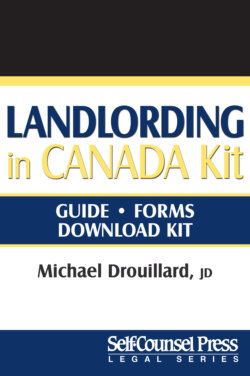Читать книгу Landlording in Canada - Michael Drouillard - Страница 4
На сайте Литреса книга снята с продажи.
INTRODUCTION
ОглавлениеA key premise of Landlording in Canada is that correct tenant screening means almost everything to the small landlord. Much of this book is dedicated to successful tenant selection and teaching you how to assess a tenancy application. For instance, many of us have heard that “credit checks are a must.” But how do we access credit information? How do we interpret it? Can you simply rely on the credit score? These questions, and many others, will be answered here.
It is one thing to learn the theory behind successful tenant screening and another to put it into practice. To make your learning curve a little less steep, included are sample case study tenant applications based on actual applications I have received as a property manager. You’ll be challenged to find as many problems with the applications as you can, and to make a decision to reject or accept the prospective tenant. Ultimately, you will learn how to make an informed decision without even meeting the applicant face-to-face.
Some inexperienced landlords pick good tenants on their first or second try without any real screening. These landlords may claim their gut feelings led them to make the right decision. In fact, they got lucky. This book shows you how to take luck out of the equation, by systematically evaluating a prospective tenant’s financial qualifications. No tenant screening system is risk-free, but the right system can lower your risk of selecting a bad tenant.
You won’t find chapters and chapters of discussion about subjects such as insurance and bookkeeping here. Maintaining adequate insurance on your rental and keeping good financial records is important, but what is far more important right now is that you learn how to objectively analyze a tenant application in order to minimize your risk. After all, what good is an efficient accounting system when there is zero income coming in because you have a poorly screened tenant not paying rent?
Tenancy laws change constantly, and they can vary quite significantly province-by-province, but this book is applicable to readers across Canada. While it is beyond the scope of the book to outline legal processes specific to every province, you will learn where to find current legal resources relevant to your home province.
This book is further distinguished by its emphasis on ethical landlording. You’ll find advice about applying your landlording knowledge in a way that both protects your interests and remains fair to the tenant.
Ethical landlording is not about granting favours or letting your tenant pay rent late. It’s about building a spirit of trust and cooperation with your tenant by acting in good faith.
Unethical landlords take advantage of their tenants, and their tenants don’t trust them. These landlords frequently struggle with uncooperative tenants, and uncooperative tenants can be costly indeed. Ethical landlording is great for business.
